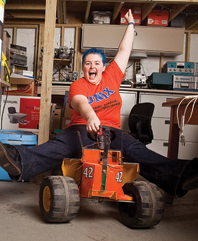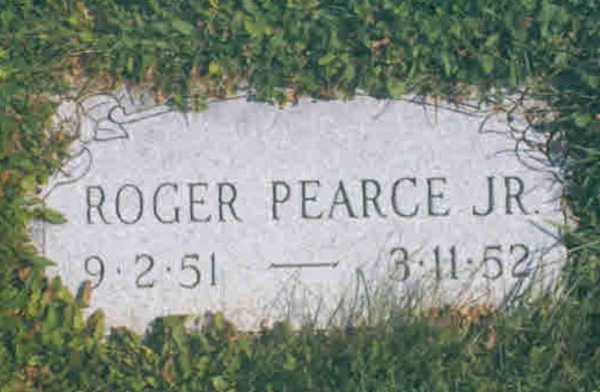What I Did with My 'Go Away Money'

Nicolle Neulist
Photo by Callie Lipkin
Gordon Chin’s wish to become a successful interior designer came true with the help of an audition video he sent to HGTV and a few design-challenged friends. But most of his fellow attorneys probably would say he had already arrived in life—he was on track to make partner at a national firm.
But in late 2008, the 36-year-old real estate attorney was let go from Locke Lord Bissell & Liddell in Washington, D.C., after billable work at the firm plummeted. While his tape did not convince the cable network to put him on the air, the footage was posted on the Internet, where friends saw it and “got the ball rolling,” Chin says.
“At least the severance package allowed me to kind of chart out the territory,” says Chin, who has dabbled in interior design for years but now is handling several major projects through his D.C.-based company GC Design. Chin accepted a confidentiality agreement that prevents him from disclosing the amount of his severance.
“There are a lot of attorneys that have other passions that they’d like to pursue,” he says, “but they’re reluctant to or they can’t or can’t take the risk. It’s a risk for a lot of people.” Plenty of young attorneys have been shown the door at their firms recently. A few like Chin make opportunity lemonade out of the lemons life handed them. Those “de-jobbed” lawyers are using their “go away money” to chase dreams outside of law—way outside.
BEER MONEY
Take Billy Gaines, whose new full-time gig is fueled with barley and hops, not lemons.
Gaines, one of the creators of the World Series of Beer Pong, started spending all his time planning the annual event and running the website BPong.com after leaving an associate position at Vedder Price in Chicago last December.
(For the squares: Beer pong is a decades-old college drinking game. It involves teams tossing or bouncing pingpong balls over a long table into one another’s partially beer-filled plastic cups. Sinking shots into your opponents’ cups means they have to slug them down, and when they run out of cups, the game is over.)
“I say this sincerely: It was the best thing that happened to me,” the former IP lawyer says of leaving the firm after a little more than two years. “I didn’t want to leave it. I needed a bump … to push me away.” Rather than severance, he was approached about voluntarily resigning months ahead of time, staying on the payroll while he weighed his options.
Gaines and his two business partners have been growing the beer pong business since 2001, when he was a college sophomore, and Gaines already was considering devoting his attention to the venture when the time came to leave Vedder Price. While working at the firm, he was spending what little available time he had trying to make beer pong into the next big sport, he says.
Even with bpong.com on pace for 2009 revenues “in the millions,” according to Gaines, increasing retail sales of beer pong-related products, and the fifth World Series slated for January 2010 in Las Vegas, Gaines fills his post-firm professional life in other ways: He is starting another business, in Internet application development.
Gaines seems open to anything—except returning to law practice, at least for now.
“You’d be surprised at the percentage of the beer pong demographic who have higher education beyond college,” Gaines says. “I always tell them to do what you want to do, not what will be looked on favorably.”
Learn how to play beer pong (video).
HAPPY HACKER
Another displaced lawyer shares Gaines’ formula for happiness. For Nicolle Neulist, laid off last spring by Locke Lord in Chicago, personal success has meant becoming a computer hacker, though not in the sinister sense you might think.
Neulist, 26, now spends much of her free time with a Chicago-based group called Pumping Station: One. The group rents a large workspace and keeps it filled with electronic toys for its members. When not creating music on a long-obsolete Commodore 128 computer, Neulist stays somewhat current as an attorney by advising the group. Pumping Station: One is not into doing the illegal, just the rebellious, such as prank-calling e-mail scammers using computer programs, she says.
Neulist has not been in a rush to go back to work, thanks in part to a two-month-salary severance package. “It did afford me more time to think about it,” she says. “It had already crossed my mind that [law] isn’t where I belong. It definitely gave me time to clear my head.”
She is looking toward a career in computer technology and is not even sure she would do law school over, given the opportunity. “You never know,” she says. “I definitely don’t regret going to law school. As to whether I plan on returning to the legal field? No.”
Of the three, Chin is the only one who seems determined to use his law degree as something more than an impressive wall hanging, though he would prefer to stay out of BigLaw. “Ideally it would be a balance of both practicing law and doing interior design,” he says. “That’s probably going to be a difficult balance to strike.”
To a lawyer faced with a layoff, a buyout or another type of career change, Chin says: “If the opportunity presents itself, definitely look into it, because you don’t want to have second thoughts or regrets down the road.
“It’s been an interesting journey, but it’s been a good experience.”
Listen to Nicolle Neulist talk about how she’s spending her time since her law firm layoff.
Stephanie Francis Ward contributed to this report.



